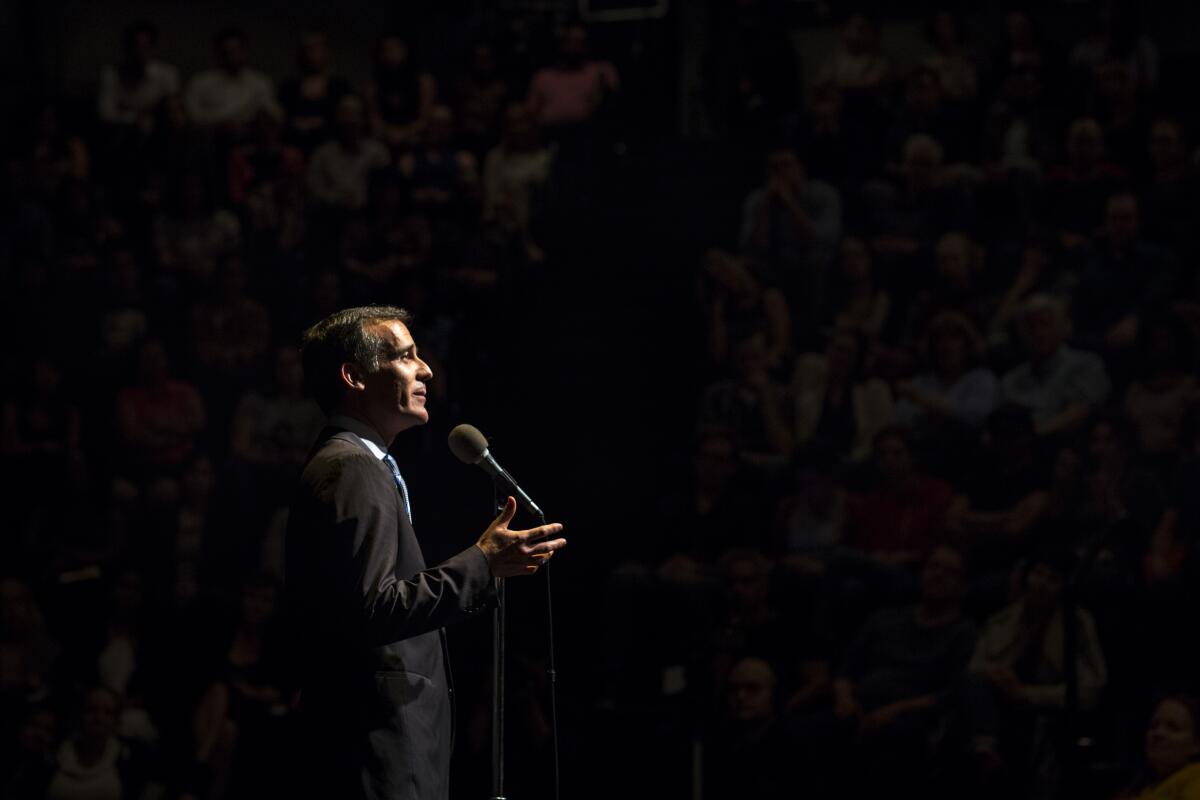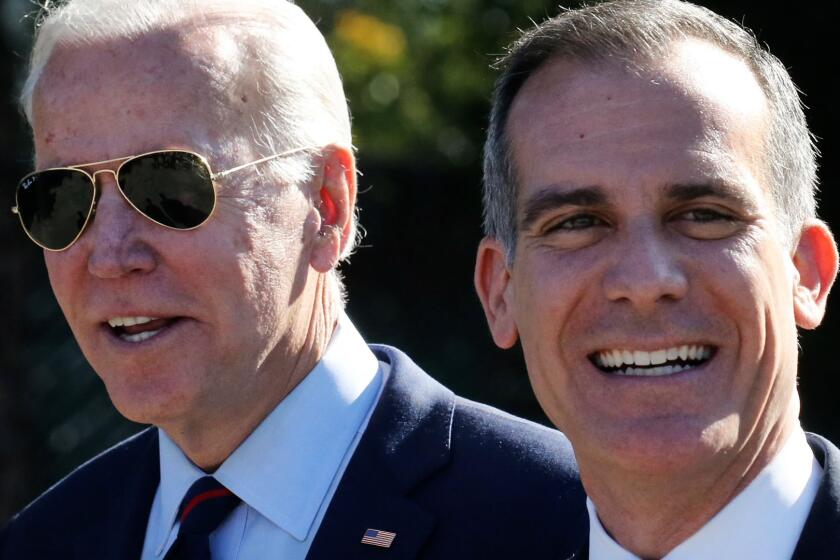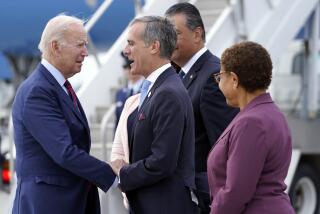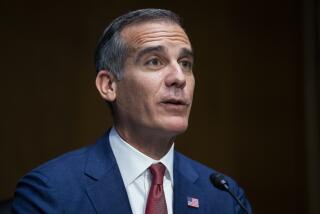After Garcetti, who leads Los Angeles?

- Share via
Is it something about Los Angeles that led Mayor Eric Garcetti to accept President Biden’s nomination as ambassador to India? Something flawed in the DNA of the city’s civic organism? Or is Garcetti’s exit just a strategic career move, not a rueful comment on the difficulty of leading this wayward city? Other ambitious citymakers have turned away from Los Angeles too, frustrated by an unaccountable apparatus of city government designed to work behind a mask of obscurity.
Garcetti may feel he’s done enough. He served eight years as mayor and a dozen years as a City Council member. His final day in office would have been Dec. 12, 2022 — an unusually prolonged second term created when voters approved moving local elections to even-numbered years.
If the Senate confirms Garcetti’s nomination, there could be a special election or the City Council could appoint someone to fill out his term. Until then, City Council President Nury Martinez is in line to fill the gap. Talk is that she may join Councilman Joe Buscaino and City Atty. Mike Feuer as a candidate in the mayoral campaign that has already started.
Given the unfulfilled ambitions of previous mayors, it’s a wonder anyone wants the job. Garcetti’s decision to step away is further notice — as if more were needed — that those who govern the city don’t seem to be able to make the machinery of city government work for Angelenos and their neighborhoods. No one at City Hall should have any illusions about the inadequacies of L.A.’s civic life, despite charter reform in 1999.
The office of mayor has more power now, but not as much as in other big cities. There are cleaner lines of authority for city department heads and between the City Council and the mayor now, but the distribution of power remains unfocused. Other reform initiatives, like the system of neighborhood councils, haven’t made local government more human-scaled, accessible or relevant.
Citizen stakeholders standing up for their small-scale interests might have reclaimed civic life in Los Angeles street by street, but in the 20 years since the neighborhood councils were inaugurated, it hasn’t happened. City Council members remain suspicious of neighborhood council involvement when development is on the table. And some neighborhood councils still squabble with City Hall about the rules, most recently over election procedures that should have been resolved long ago. Los Angeles has a half-finished revolution in civic life, but further reform has no momentum in City Hall.
And there is none elsewhere either. Los Angeles is fractured not only by geography, race and class but also by rival interest groups, each with a stake in some part of an impenetrable system of city government. Change will not come from wealthy men like Eli Broad and Warren Christopher, who propelled charismatic projects in the recent past, charter reform among them. They’re gone, and others who could take their place — such as Elon Musk — are unwilling to accept the risks of molding the city’s future. Angelenos might rightly ask, who is left to lead us?
Declared and potential 2022 candidates make for a shallow pool of possibilities. From which organizational culture should the next mayor come? The structures of the county Board of Supervisors, the state Legislature, the City Council and the corporate boardroom, given past results, have only spotty answers to the organizational puzzle that is city government. And yet from city government must come workable responses to the shameful condition of the city’s homeless residents, the rising level of violent crime, the decay of the city’s infrastructure, reform of community policing and equity and safety for all Angelenos.
Garcetti’s second term as mayor has been shadowed by the economic and social effects of the COVID-19 pandemic (where the mayor showed a steady hand) and the surge in the number of homeless Angelenos (where the mayor’s response had little effect despite his efforts). When organization and structure existed already — for revitalizing the Los Angeles River, for example, and expanding public transit — Garcetti delivered. When there was only a slogan and a photo opportunity — the Great Streets revitalization program is an example — the results have been disappointing.
Angelenos are used to disappointment, to mayors who continually rebrand Los Angeles in a flurry of shiny project descriptions and optimistic predictions about how they will cure the ills of the city. Former Mayor Antonio Villaraigosa seemed to have one to unveil nearly every week. The “big idea” that will renew Los Angeles remains elusive, however.
Old-style politics will determine who is put before voters in 2022 to fill the mayor’s slot. It’s likely Garcetti’s elected successor will not be more equipped than he has been to use the city’s governmental machinery effectively.
Angelenos — mostly on their own in making and remaking civic culture — need to lead themselves when their leaders check out. And they should be looking to structures of civic life that are local and parochial more than sweeping and citywide. Garcetti’s willingness to depart reveals that what currently passes for civic culture in Los Angeles has little room for loyalty to Los Angeles. With Garcetti’s exit, the next mayor will have a harder time governing wary Angelenos. The office of mayor, it seems, does not provide L.A. with a profile in leadership.
President Biden selected Eric Garcetti to become U.S. ambassador to India. Garcetti would step down as L.A. mayor after Senate confirmation.
D. J. Waldie’s most recent book is “Becoming Los Angeles: Myth, Memory, and a Sense of Place.”
More to Read
A cure for the common opinion
Get thought-provoking perspectives with our weekly newsletter.
You may occasionally receive promotional content from the Los Angeles Times.










